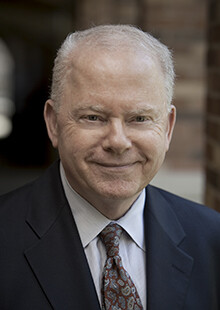
John Langbein, Sterling Professor Emeritus of Law and Legal History and Professorial Lecturer in Law at Yale Law School, will deliver the University of Nebraska College of Law’s Winthrop and Frances Lane Foundation Lecture at noon Friday, Nov. 6, at the college’s Hamann Auditorium. The lecture is free and open to the public.
Probate, the state-operated system of family wealth transmission, has been marginalized in contemporary American practice by the rise of free-market competitors in the financial services industry. Today, it is banks, mutual fund companies, brokerage houses, insurance companies and retirement plan operators who handle most intergenerational wealth transfer. Langbein’s lecture, “The Nonprobate Revolution: Privatizing Family Wealth Transfer in the United States,” will address the causes and extent of the nonprobate revolution, and about some worrisome drawbacks that are emerging as this new system of wealth transfer takes hold.
“We are delighted to host Professor Langbein as this year’s Lane lecturer,” Dean Susan Poser said. “He is very respected and we are fortunate to have the support of the Lane Foundation so that speakers of his caliber can be brought to our academic community.”
Langbein is an eminent legal historian and a leading American authority on trust, probate, pension and investment law. He teaches and writes in the fields of Anglo-American and European legal history, modern comparative law, trust and estate law, and pension and employee benefit law, or ERISA. He has long been active in law reform work, serving under gubernatorial appointment as a uniform law commissioner since 1984. He was the reporter and principal drafter of the Uniform Prudent Investor Act (1994), which governs fiduciary investing in most American states, and he was associate reporter of the American Law Institute’s Restatement (Third) of Property: Wills and Other Donative Transfers (3 vols. 1999-2011).
Langbein has written extensively about the history of civil and criminal procedure, and about the contrasts between modern American and continental procedure. His book “The Origins of Adversary Criminal Trial” (2003) received the Coif Biennial Book Award (2006) as the outstanding American book on law. In 2009 he co-published “History of the Common Law: The Development of Anglo-American Legal Institutions,” a textbook on the history of the legal system. He also co-authors a course book on pension and benefit law.
The Winthrop and Frances Lane Foundation provides scholarships to students at the College of Law and Creighton Law School. The foundation also provides grants to support law faculty research and to underwrite the Lane Foundation Lecture. Winthrop Lane was born in Omaha in 1889 and attended Harvard Law School. He was a partner in the firm of Rose, Wells, Martin and Lane, a predecessor to the present Baird Holm law firm in Omaha.







